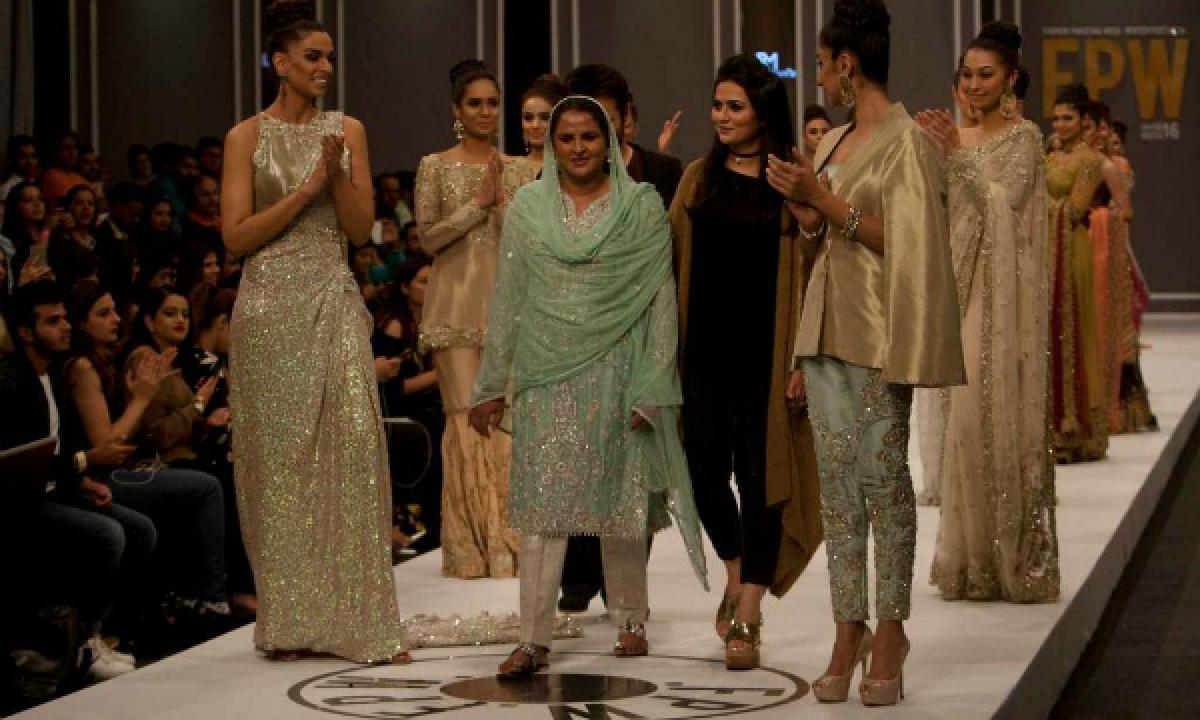Live
- Over 7,600 Syrians return from Turkiye in five days after Assad's downfall: minister
- Delhi BJP leaders stay overnight in 1,194 slum clusters
- Keerthy Suresh and Anthony Thattil Tie the Knot in a Christian Ceremony
- AAP, BJP making false promises to slum dwellers for votes: Delhi Congress
- 'Vere Level Office' Review: A Refreshing Take on Corporate Life with Humor and Heart
- Libya's oil company declares force majeure at key refinery following clashes
- Illegal Rohingyas: BJP seeks Assembly session to implement NRC in Delhi
- Philippines orders full evacuation amid possible volcanic re-eruption
- Government Prioritizes Welfare of the Poor, says Dola Sri Bala Veeranjaneyaswamy
- Two Russian oil tankers with 29 on board damaged due to bad weather
Just In

When Mukhtaran Mai, a Pakistani icon of courage, donned a pastel green salwar kameez and smilingly walked down a fashion ramp in Karachi, she appeared least troubled by her harrowing past -- of her gang-rape and being paraded naked in public 14 years ago.A red carpet reception in Pakistan\'s largest city, attended by the country\'s fashion elite, served as the forum for Mukhtaran Mai\'s fashion \"
New Delhi:When Mukhtaran Mai, a Pakistani icon of courage, donned a pastel green salwar kameez and smilingly walked down a fashion ramp in Karachi, she appeared least troubled by her harrowing past -- of her gang-rape and being paraded naked in public 14 years ago.
A red carpet reception in Pakistan's largest city, attended by the country's fashion elite, served as the forum for Mukhtaran Mai's fashion "debut" -- something she said she was doing as a symbol of courage and hope for other Pakistani women and to make a bold statement against the culture of shame that often shrouds rape survivors.
"I have fought with society, with my family and also with the Pakistani government. I was thrown out of my house, I was told to die or 'you will be killed'. So, this walk was much easier than that," a confident Mai told IANS in a telephonic conversation from her native village of Meerwala.
On June 22, 2002, at around 2 p.m., Mai was raped by a group of men after being dragged into the house of a Mastoi tribesman in Meerwala in Muzaffargarh district of Punjab province.
She identified 14 men who were put on trial. Six were handed the death sentence. But all of them were eventually released on appeal.
Rather than commit suicide, as many Pakistani women in her position have done, Mai went public and fought the case and against the stigma -- and became an international advocate for women's rights. She founded a charity that sponsors a women's shelter and a girl's school in her rural hometown of Meerwala, winning international renown for her bravery.
"I tried to commit suicide many times after my family -- brothers and uncles -- termed me a shame for the family. But my father and mother stood by me like a rock, which gave me strength," an emotional Mai said.
After rejection by her family and the society, Mai believed the best way to overcome such trauma was to gain better education. She used the compensation money -- Rs 500,000 given to her by the Pakistan government for her ordeal -- to start two schools in her village. One was for boys and the other for girls.
Mai went out of her way to enroll the children of her molesters in her schools to show that she bore no grudges.
"I enrolled their kids in my school, I want to educate them so that they can tell them (the abusers) that they committed a big mistake. That would be the biggest revenge," Mai, whose mother tongue is Seraki, told IANS in Urdu, the language she learnt in the last few years.
Seraki is spoken in southern Punjab and the neighbouring areas of Balochistan.
Mai has worked tirelessly for the cause of women's rights in Pakistan, which ranks at the lowly position of 121 out of 155 countries in the UNDP 2014 Gender Inequality Index.
"I started with four girls. Our Meerwala village had no school till I opened one. After years of struggle and tireless work, today we have over 700 girls enrolled in our school."
Under the banner of Mukhtar Mai Women Organisation, Mai, with the help of donors and well wishers, opened a shelter for helpless women who have nowhere to turn to in a conservative society.
"I want to be the voice of those women who face issues similar to what I did," Mai said.
Her organisation has also started a toll-free women's helpline, through which they rescue women who fear to speak out against their families.
"I ask my sisters to not lose hope in the face of injustice. We will get justice one day for sure," Mai stressed. "My message for my sisters is that we aren't weak. We have a heart and a brain. We also think."
By Aadil Mir

© 2024 Hyderabad Media House Limited/The Hans India. All rights reserved. Powered by hocalwire.com







